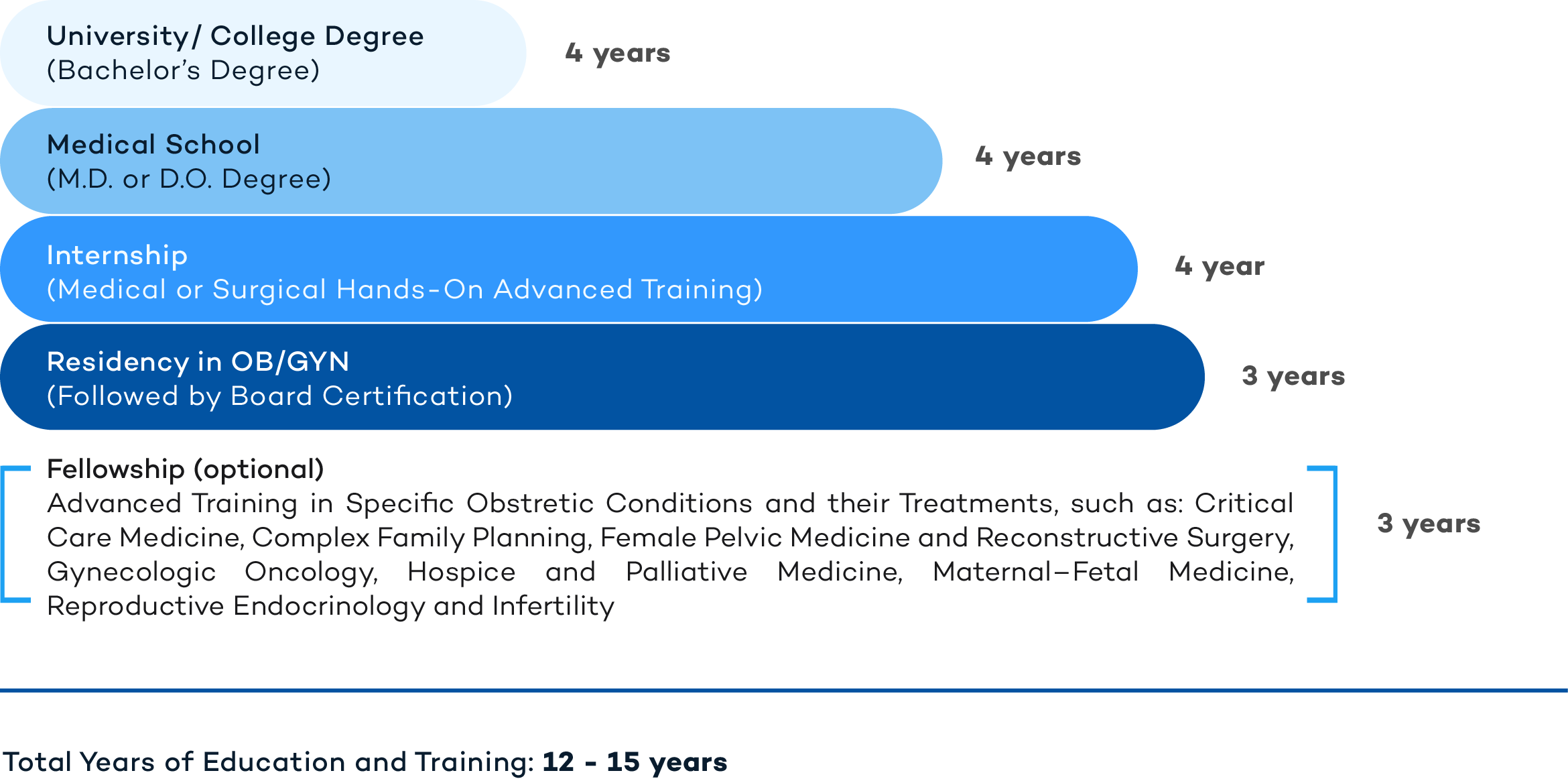

An Obstetrician/Gynecologist is a Board-Certified Doctor that focuses on the health of women before, during, and after pregnancy. They are experts in diagnosing and treating conditions of the female reproductive system and related diseases. Through an intensive training program, Obstetricians/Gynecologists acquire special knowledge, skills, and professional expertise in the medical and surgical care of women related to pregnancy and conditions of the female genital system.
The level of expertise to treat a specific condition and the credentials obtained are important factors when choosing the right physician. You may do your diligence to check the credentials, scope of practice, and practice style of your Obstetricians/Gynecologists on myDoqter. You can also review what other patients have to say about their experience under the doctor’s care.
Obstetricians/Gynecologists are doctors who have earned an M.D or D.O degree and have completed advanced medical and surgical training. The following is a representation of the years of education and training that an Obstetrician/Gynecologist has undergone.

OBSTETR from the Latin word ‘Obstetricius’ for midwife, and ICS from the Latin word ‘icus’ and Greek root ‘ikos’ meaning ‘pertaining to’ mainly used to describe a science. GYNECO from the Greek word ‘Gyne’ for ‘woman’ + LOGY from the Greek word ‘logia’ which means ‘logic’ or ‘the study of’.
An Obstetrician/Gynecologist will treat an extensive number of women’s health and reproductive conditions, including:
Irregular bleeding: that can occur with the menstrual cycles and can be associated with abnormal symptoms like heavy bleeding, clots, and cramping.
Breast lump & common breast problems: may be initially addressed by your Ob/Gyn. Changes in breast tissue including abnormal breast pain, changes, inflammation, or lumps may be symptoms that your physician can address.
Yeast infections can produce irritation and inflammation: of the vagina and are caused by a yeast cell overgrowth in the region.
Uterine fibroids are benign (non-cancerous) growths: of muscle and fleshy tissue that develop in the wall of the uterus. They can produce a variety of symptoms including heavy or painful bleeding, frequent urination, and fertility issues.
Endometriosis: occurs when abnormal endometrial tissue growth occurs outside the normal location of the uterus. The endometrium is the internal lining of the cavity of the uterus or womb, and in endometriosis it grows in excess and can be present in areas outside the uterus, and even surrounding the ovaries. This can result in inflammation of affected and surrounding tissues, and can result in pain and scar tissue formation in the affected areas. Chronic endometriosis is a cause of infertility in women.
Chlamydia and gonorrhea: are common sexually transmitted infections (STI) caused by the bacteria Chlamydia trachomatis and Neisseria gonorrhea, respectively. They can cause serious, permanent damage to a woman's reproductive system if left untreated. They can also lead to female infertility in the future.
Condyloma: also known as genital warts, are a common sexually transmitted infection (STI) caused by the human papillomavirus (HPV). Routine pap smears can screen for HPV, and vaccines can be provided by your gynecologist for prevention.
Decreased libido: is characterized by reduced sex drive.
Dysmenorrhea: is associated with menstrual cramping and painful periods caused by uterine contractions.
Dyspareunia: is the association of significant pain during intercourse that occurs just before, during, or after interaction.
Herpes: is a common sexually transmitted infection caused by the herpes simplex virus (HSV).
Incontinence: or loss of bladder control, can result in frequent urges to urinate and urine not held properly in the bladder, which can lead to leakage.
Infertility: is defined as the inability of a couple to conceive despite having carefully timed and unprotected sex for one year, or if a woman can get pregnant but keeps having miscarriages or stillbirths
Interstitial cystitis: also known as Painful Bladder Syndrome, is a chronic condition causing bladder pressure and pelvic pain.
Lichen sclerosus: is a chronic inflammatory skin disorder causing white patches of skin that can occur in the female genital area.
Lactational Mastitis: can lead to very painful inflammation of the breast tissue caused by a blockage in milk duct or by infection with bacteria. It usually occurs in the first three months of breast-feeding and can produce significant breast pain with swelling, warmth, fever, and chills.
Ovarian cysts: also known as cystic ovarian mass, are sac-like structures within or on the surface of an ovary. They may occur by themselves as one or a few cysts, or may be associated with Polycystic Ovarian Syndrome, a hormonal disorder causing enlarged ovaries with multiple cysts that can lead to menstrual irregularities and excess male hormone (androgen) levels.
Pelvic pain: is pain or discomfort in the lowest part of the abdomen, between the belly button and groin.
Premenstrual syndrome: also known as PMS, can consist of a constellation emotional, physical, and psychological symptoms that occur during certain days of the menstrual cycle. Symptoms may include mood swings, tender breasts, food cravings, fatigue, irritability, and depression.
Urinary Tract Infections: occur when the bladder or any part of the urinary tract (kidneys, ureters, bladder and/or urethra) become infected. There may be associated symptoms of painful or burning urination, cloudy urine, and abdominal pain.
Vaginitis: is an inflammation of the vagina caused by an infection or disruption of the balance of vaginal bacteria, and may result in a vaginal discharge, itching, and pain.
Vulvodynia: also known as Vulvar Pain, is a chronic and unexplained pain in the area around the opening of the vagina. Symptoms may also include burning and rawness in the genital area.
Ultimately, Prevention is the most important step towards maintaining the health of your female reproductive health. The American Board of Obstetrics & Gynecology recognizes that Obstetricians and Gynecologists provide primary and preventive care for women and serve as consultants to other health care professionals.
The United States Preventive Services Task Force (USPSTF) recommends screening for cervical cancer in women age 21 to 65 years with cytology (Pap smear) every 3 years. When you visit the Obstetricians/Gynecologist, you will also receive important information regarding your reproductive health as well as managing pregnancy and childbirth-related care. Important topics include, well-woman visits, practice of safe intercourse, proper vaginal hygiene, family planning, mammograms, and pregnancy care.
Your relationship with the Obstetrician/Gynecologist is potentially one that will be long-term and doctors may offer valid but different treatment approaches for your specific condition and concerns. Please keep this in mind when searching and reviewing the right physician match for you.
You can read more about Obstetrics and Gynecology in the following links:
https://www.abms.org/member-boards/contact-an-abms-member-board/american-board-of-obstetrics-and-gynecology/
https://www.abog.org/about-abog/policies/definition-of-an-obstetrician-and-gynecologist
https://www.abms.org/member-boards/contact-an-abms-member-board/american-board-of-obstetrics-and-gynecology/
https://www.acog.org/-/media/For-Patients/faq085.pdf?dmc=1&ts=20200311T2152163070